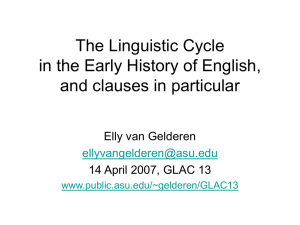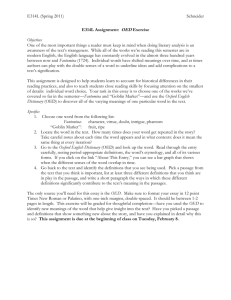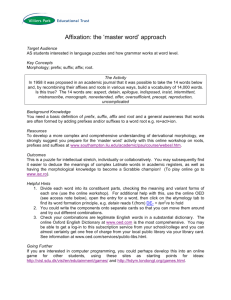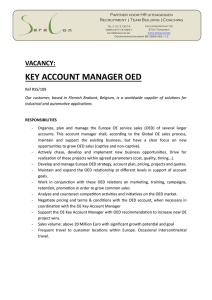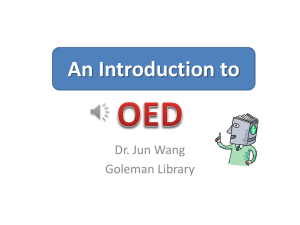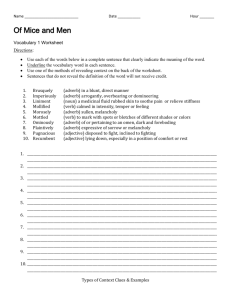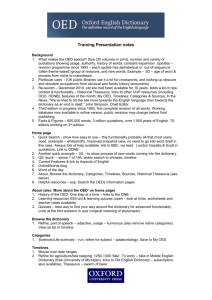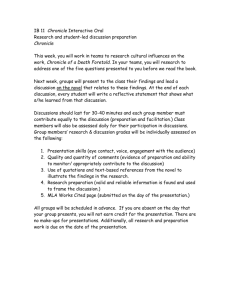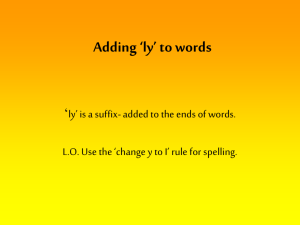The linguistic Cycle in the Clause
advertisement
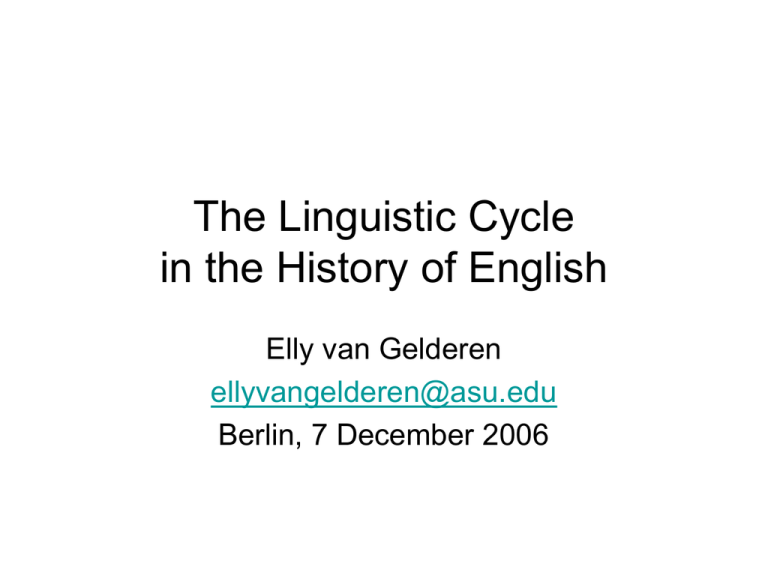
The Linguistic Cycle
in the History of English
Elly van Gelderen
ellyvangelderen@asu.edu
Berlin, 7 December 2006
Aims
• To present a description of some recurring
changes in the history of English
• To understand some of these cycles
• Examine internal and external factors of
linguistic change and their interaction
Outline
• Background on the Cycle/Spiral
• Examples of the Cycle in brief:
– Negatives
– Demonstratives
– Aspect
• Study of recycling in clause markers
– Prepositions
– Adverbs
Background on the Cycle/Spiral
• de Condillac, Tooke, A.W. von Schlegel,
von Humboldt, Bopp
• more recently: Tauli 1958 and Hodge 1970
• Grammaticalization literature:
word
>
clitic >
affix >
(from Hopper & Traugott 2003)
0
Internal and External Change
• Jespersen: "the correct inference can only
be that the tendency towards ease may be
at work in some cases, though not in all,
because there are other forces which may
at times neutralize it or prove stronger
than it".
• Von der Gabelentz (1891/1901: 251/256):
"Deutlichkeit" ('clarity') and
"Bequemlichkeit" ('comfort').
Data
• Old English Dictionary Texts (all of OE)
• Helsinki Corpus (OE through eModE)
• Oxford English Dictionary
– http://dictionary.oed.com.ezproxy1.lib.asu.edu/entrance.dtl
• Oxford Text Archive electronic-texts etc
– http://www.georgetown.edu/labyrinth/
• Modern corpora: British National Corpus,
International Corpus of English
– http://sara.natcorp.ox.ac.uk/lookup.html
Negative Cycle
(1)a.
b.
c.
d.
no/ne
ne
(na wiht/not)
(ne) not
not
-not/-n’t
eOE
OE, especially Southern
ME, especially Southern
LME
LME
Old English – South:
(2)Næron 3e noht æmetti3e, ðeah ge wel ne dyden
not-were you not unoccupied. though you well not did
`You were not unoccupied, though you did not do well'.
(Pastoral Care, Cotton, Sweet, 206).
Matthew White’s map
www.georgetown.edu/
faculty/ballc/oe/oe
map.html
Negative Concord Cycle
(1) ænig monn ne mæg tuæm hlaferdum hera
any man not may two lords serve (Northumbrian c950)
(2) ne mæg ænig twæm godum ðeowigan
not may any two gods serve (Mercian C10)
(3) Ne mæg nan man twam hlafordum þeowian
not may no man two lords serve (Corpus c1000)
(4) Ne mayg nam man twam hlaferden þeowian
not may no man two lords serve (Hatton c1150)
Matthew 6.24
Demonstratives
(1) demonstrative/adverb > definite article > Case/non-generic > class
marker > 0
(2) a.
min
þæt
ungesælige
mod
=OE
my
that
unhappy
spirit
b. min
ungesælige
mod
(Gregory's Dialogues, 4.9, from Wood, to appear: 15)
(3) gife to … þa munecas of þe mynstre
=LOE
give to … the monks of the abbey (Peterborough Chron. 656)
(4) To frowne vpon th'enrag'd Northumberland =EModE
(2Henry4, Shakespeare)
(5) Oh they used to be ever so funny houses you know and in them
days … They used to have big windows, but they used to a all be
them there little tiny ones like that. (BNC - FYD 72)
Perfective aspect
Cycle:
(1) adverb > affix > 0
One stage:
(2)a.
Elizabeth's accession allowed him to receive back his wife
(BNC-GTB938)
b. a husband who changed his mind to receive his wife back
without ceremony (BNC-HTX2122).
-
Pattern (a) has become more frequent in the recent period (Davies
2005), even with definite nominals:
In the 100-million British National Corpus, receive occurs nine times
in constructions such as (2a) and four times in constructions such as
(2b) (twice with a pronoun and twice with a DP)
-
The use of pronominal objects, typical for the first order, with these
verbs has gone down too.
Other such adverbs
• evaporate out
• dissipate away
• spend down
• receive in
boost up
issue out
order up (from the
library)
offer up
Clause markers
1.
WH > Yes/No marker
2.
Relative > Conjunction
3.
Preposition >
Complementizer/Conjunction
4.
VP adverb > Clausal adverb
Creation of new Clause boundaries
Whether from WH-pronoun to Yes/No and C
(1) Hwæðer þara twe3ra dyde þæs fæder willan?
Who of-the two did the father’s will Ags. Gosp. Matt. xxi. 31
(2)
þær se snotera bad hwæþer him alwalda
æfre wille ... wyrpe gefremman.
there the wise waited whether him almighty ever would ...
change accomplish
`There the wise one waited whether the almighty would ever
grant him change' (Beowulf 1313-5).
(3)
Whether hadst thou rather be a
Faulconbridge, ...
`Would you rather be a Faulconbridge' (Shakespeare,
I, i, 134).
John
Relative > Conjunction
(1)
api
rama vanam
gacchati
Sanskrit
Q
Rama wood-ACC go-3S
`Is Rama going to the forest'?
(2)
ratham
ko
nir
avart aya
chariot-ACC
who
down
rolled
Sanskrit
`who rolled out the chariot' (from Kiparsky 1995: 154).
(3)
kya ram jata he
Q
Ram
`Is Ram going'?
go-3S is
Hindi/Urdu
English relatives in OE and ME
OE se þe > þe or þæt:
(1) scyldwiga … se þe wel þenceþ
shield-fighter … the that well thinks/judges
`(Every sharp) shield fighter, who judges well' (Beowulf 287-9).
(2)
as theo the duden with Godd al thet ha
walden.
`as those who did with God all that they wanted’.
(Ancr. R. III 492)
New relatives
(1)
a laide de Dieu notre Seigneur, Qui vous
douit bonne vie et longue.
`With the help of God, our Lord, who gives
us a good and long life' (Bekynton, from
Rydén, p. 131).
(2)
be the grace of God, who haue yow in
kepyng
`by the grace of God, who keeps you'
(Paston Letters 410).
Preposition > Complementizer/Conjunction
After from P > C
(1)
Ercenberht rixode æfter his fæder
`E. ruled after/following his father' (Chron A, 640)
(2) a.
[æfter him] Stephanus feng to rice.
`after him (i.e. Pope Leo), Stephanus became pope'.
(Chronicle A, anno 814 [816])
[æfter þissum gefeohte] cuom micel sumorlida.
`after this fight, there came a large summer-force'
(Chronicle A, anno 871)
b.
(3) a.
b.
[Æfter þysan] com Thomas to Cantwarebyri
`After this, Thomas came to Canterbury'.
(Chronicle A, anno 1070)
[æfter ðon] uutedlice ic eftariso ic forlioro vel iowih in galileam
`after that, surely I arise-again I come before you in Galilee'
(Lindisfarne Gospel, Matthew 26. 32).
Percentages of demonstrative
objects (Dem) with after and fronting
800
VPs
Dem 4/52 = 8%
Fronting11/52= 21%
<892
Chron
950 Northern
Lindisfarne
>893
Chron
2/26= 8%
7/26= 27%
8/29= 28%
11/29= 38%
17/22= 77%
12/22= 55%
(1)After that the king hadde brent the volum
(Wyclyf 1382, taken over in Coverdale 1535 and KJV
1611, from the OED).
(2)After that Raleigh had Intelligence that Cobham had
accused him, he endeavour'd to have Intelligence from
Cobham (HC, EModE2)
(3) Aftir he hadde take þe hooli Goost (c1360 Wyclif De
Dot. Eccl. 22).
(4) After thei han slayn them (1366 Mandeville174).
Four stages:
PP
PP
PP (that)
P that
C
900 (Chronicle A) – present
950 (Lindisfarne) - 1600 (OED 1587)
1220 (Lambeth) - 1600 (OED 1611)
1360 (Wycliff) - present
For : P to C
(1)
ouþer for untrumnisse ouþer for lauerdes neode
ouþer for haueleste ouþer for hwilces cinnes oþer
neod he ne muge þær cumon
`either from infirmity or from his lord's need or from lack of means or
from need of any other kind he cannot go there' (Peterborough
Chronicle, anno 675).
(2)
forþam Trumbriht wæs adon of þam biscopdome
`because T had been deprived of his biscopric' (Peterborough
Chronicle, anno 685).
From lexical to grammatical category
VP adverb > Clausal adverb
(1)
(2)
(3)
(4)
and he shulde goo frank and quite.
(OED 1475)
All other lawfull thinges..to do as liberally,
frankelie, lawfully..as if they..had been naturally
borne within this realme (OED, 1541)
Therefore [with franke and with vncurbed
plainnesse], Tell vs the {Dolphins} minde.
(Henry V)
She... Can you wonder that I'm disinclined
for amusement? He.Frankly, I do (OED 1888)
(1)
(2)
(3)
You wrote so probably that hyt put me in a
feare of daungerys to come. (OED, 1535)
A source, from whence those waters of
bitterness..have..probably flowed (OED,
1647)
for, tho very probably I shall not have
occasion for them, yet it wou'd be very
vexatious to want them shou'd ther be
occasion. (1690, Letter by Charles Hatton,
HC)
Conclusions
• description of some changes
– Negative, Demonstrative, (Agreement), and
Perfective Cycles
– Clause marking through
• wh
• P
• VP adverb
• Reason: semantic features are reanalyzed as
grammatical
• internal (grammaticalization) vs external
(renewal)
